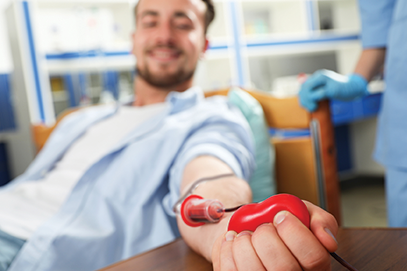New Blood Donation Guidelines Promote Inclusiveness
January 18, 2024
Federal guidelines have long excluded sexually active gay and bisexual men from donating blood. In August 2023, the Food and Drug Administration (FDA) announced rule changes that expanded this group’s eligibility, potentially allowing more people to help save lives through blood donation.
Brief History of Blood Donation in the U.S.

Previous blood donation rules stemmed from the start of the HIV (human immunodeficiency virus) epidemic in the 1980s. During that time, researchers recognized blood transfusions could spread HIV from blood donor to recipient, which meant the FDA guidelines banned men who had sex with men from giving blood to help limit the spread of HIV.
In 2015, the FDA began allowing gay and bisexual men to donate if they had not had sex with a man for 12 months.
In 2020, the FDA reduced the timeframe to three months.
Significant advancements in HIV screening and the urgent need for safe blood products led scientists to reconsider donor eligibility. After decades of study, the FDA determined it was time to change the blood donor screening process.
Now, instead of asking men in this group to answer questions about their sexual activity, screeners will ask all potential donors the same questions.
Blood Donation FAQs
Now, the screening process asks everyone — regardless of gender, sex, or sexual orientation — questions related to behavior in the last three months that raises the risk of HIV.
Examples of these behaviors include:
- having new or multiple sexual partners and engaging in anal sex,
- having sex with someone who ever had an HIV infection and using nonprescription injection drugs.
Researchers consider people who answer “no” to all of these questions at low risk of a recent HIV infection. They can donate blood if they meet all other eligibility requirements.
Answering “yes” to any of the questions raises the concern that the person may have an HIV infection. They must wait three months before trying to donate blood again.
You may need to wait to donate blood if, in the last three months, you have:
- Had a blood transfusion
- Had a body piercing or tattoo not done with single-use equipment
- Received treatment for gonorrhea or syphilis
PrEP Users
The new rules also recommend a waiting period if you take medicines to prevent HIV infection. These medicines are called PrEP (pre-exposure prophylaxis) and might cause a negative HIV test even if infection is present. The new guidelines recommend delaying blood donation until three months after the last use of PrEP pills or delaying two years after receiving long-acting, injected PrEP.
A lifetime ban remains in place for anyone who has had a confirmed positive test for HIV infection or has taken medicines to treat HIV infection.
Donate Blood Today!
January is Blood Donor Awareness Month, and at Memorial Healthcare, we encourage everyone to consider being a regular donor.
Did you know that just one donation can:
- Save up to three lives.
- Provide blood transfusions for people with traumatic injuries, who need surgery, or are undergoing treatment for cancer and other diseases.
For more information or to find a blood donation center or donor event near you, visit OneBlood.org.
